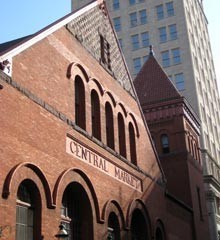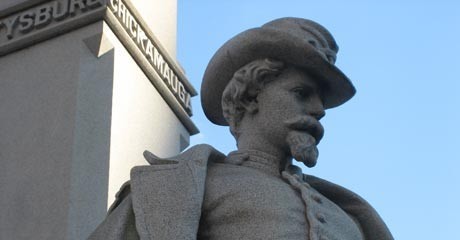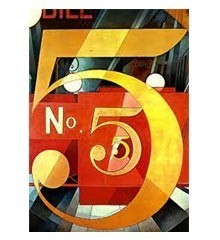War Between the States
Lancaster played an important role in events that affected the course of the Civil War—from stops on the ‘underground railroad’, to political pressures for the abolition of slavery, to providing troops and supplies, to aid for wounded soldiers, to lobbying for post-war reconstruction.
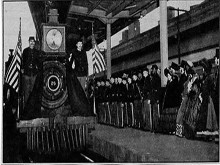
Abraham Lincoln in Lancaster
Lincoln made a brief speech in Lancaster in 1861, traveling to his inauguration in Washington. Four years later, the funeral train carrying his body, passed through Lancaster. Buildings were draped in mourning and thousands of citizens carrying flowers bowed in silence as the train passed. There were 20,000 mourners waiting for the train. A sign at the train depot read: “Abraham Lincoln, the illustrious Martyr of Liberty; the nation mourns his loss; though dead, he still lives”. Former president James Buchanan was in town for the event. Congressman Thaddeus Stevens, a frequent critic of the President, was seen on a rock along the train route. An eyewitness stated of Stevens, “he seemed absorbed in silent meditation, unconscious that he was observed. When the hearse car approached, Stevens reverently uncovered his head, and replaced his hat as the train moved away”.
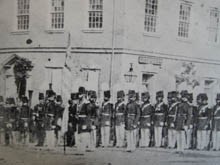
In support of the war effort
Lancaster’s General John Reynolds—was considered by both the Union and Confederate armies to be the best general in the Union Army. General Reynolds was offered the command of the Army of the Potomac, but refused saying he didn’t want to take orders from Washington politicians. His distinguished military career included the Battle of Chancellorsville, the second Battle of Bull Run, and the Battle of Gettysburg where he was killed on the first day of fighting by a Confederate sharpshooter.
The Lancaster Fencibles—was one of the first of many volunteer companies that answered President Lincoln’s call for 75,000 volunteers at the start of the war. They were regarded as the finest infantry company in the state. Lancaster supplied one of the first full regiment of soldiers in 1861; men who enlisted for three-years service. Many soldiers from Lancaster fought with Pennsylvania regiments at the Battle of Gettysburg.
The Patriots Daughters – were a Lancaster women’s service group, was created by Lancaster women affected by the thousands of Union soldiers that passed through Lancaster in need of food, clothing, and medical supplies, which they provided. These compassionate women traveled to Gettysburg to nurse wounded soldiers.
Supplies – from Lancaster not only were vital to the war effort, they provided a strong economic stimulus for the city. Contracts for horses, rifles, wagons, textiles, leather goods, and grain kept the economy strong during the Civil War. For example: Gunmaker Henry Leman had a $800,000 contract to repair muskets at the rate of 1,000 a day. S.S. Cox & Co. Coach Manufacturers of Lancaster had a contract to supply 100 army wagons. John Dellinger & Co. had an order for 20,000 flannel shirts at 85 cents each. David Bair had an order for 20,000 Canton Flannel drawers at 41 cents each.
Visit –
lancasterhistory.org
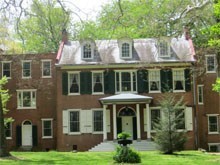
Political rivalry
Two very influential men from Lancaster, James Buchanan and Thaddeus Stevens, were among the most dynamic forces in the nation at the time of the Civil War. These Lancaster lawyers, powerful Washington personalities, and lifelong bachelors were bitter rivals.
James Buchanan – Washington diplomat
Buchanan, a Democrat, was the 15th President of the United States. He was the only President to come from Pennsylvania, and the only bachelor President. His niece, Harriet Lane, served as first lady. Buchanan came to the presidency with great qualifications – wealthy lawyer, State legislator, Congressman, Senator, Minister to Russia and Great Britain, and Secretary of State. He disapproved of slavery, but was against going to war. As President, his efforts to maintain peace were seen as a sign of weakness by both the North and the South.
Visit -
lancasterhistory.org
President Buchanan’s Wheatland
Buchanan’s tomb
Thaddeus Stevens – ‘Dictator of Congress’
Born with a clubfoot, Stevens had a prominent limp, and he wore a rather unattractive wig that could be put on in any direction. He was a stern, sarcastic, and fiery Republican. Stevens was considered to be the most powerful congressman in Washington, and wrote most of the legislation that paid for the Civil War. As early as 1850, he spoke out for the abolition of slavery, and actively supported the Emancipation Proclamation. Stevens was the leading force in the passage of the 13th Amendment abolishing slavery. He drafted the 14th Amendment and the Reconstruction Act. While practicing law in Lancaster, he frequently defended runaway slaves. There was an ‘underground railroad’ station in the cellar of his office on S. Queen Street. He stipulated in his will that he be buried in a cemetery that had no racial discrimination. His tomb is in Shreiner’s Cemetery on W. Chestnut Street. Despite his rough demeanor, 20,000 people attended his funeral.
Visit –
lancasterhistory.org
Stevens home and office
Stevens tomb
